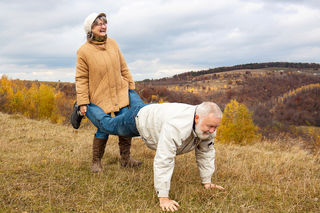
Aging
Surprising Gifts of Later Life
Losses in later life are offset by many gifts about which we hear too little.
Posted August 18, 2018
Decades of research have established that the things we most fear about aging, like severe dementia and debilitating frailty, are the exception, not the rule, yet the mistaken idea that aging equals devastating decline persists and causes enormous suffering. There are, of course, some losses in later life, but aging also brings many developmental trends that enhance our own well-being and enrich the lives of others. And we hear far too little about these.

Some of the surprising gifts of age include deepening acceptance of ourselves and of others, imperfections and all; a growing sense of being embedded in something greater than ourselves (gerotranscendence); an increasing ability to find ingenious solutions to complex and important problems; and enhanced capacities for contentment (even in trying circumstances) and for enjoying simple pleasures.
My own journey into the apparent abyss of old age began in 2000 quite by accident – and with great resistance – but it has enhanced my view of aging, and my life, immensely. Like most of us raised in such a youth-oriented and age-fearing culture, my view of aging was conflicted. Though blessed with wonderful grandparents as a child and a mother who became even more remarkable as she aged, a series of events made me aware that although their being old hadn’t been a problem for me, the prospect of being old myself was. And I knew my aversion to aging was not unique.
At age 54 when someone referred to me as a crone, I unexpectedly found myself looking for good news about growing older. All I really knew about the crone at that point was that she was old and represented the devouring aspect of the ancient triple goddess. Not a very promising start in terms of good news, but it was all I had to go on so I began reading myths from around the world. I was surprised and delighted by the old women I discovered there. Some were destroyers, but purposefully so, and many grandmother goddesses were not destroyers at all. The Beautiful Old Woman in Red Garments, for example, taught the Chinese the arts of cooking, herbology, and medicine. And the African goddess Mawu, co-creatrix of the world, is also known as the Old Woman of the West who brings the cooling western winds. Most surprising, in both Celtic and Aztec mythology, the goddess of sexuality was an old woman!
Intrigued, I began reading folktales – stories of ordinary people, rather than gods and goddesses – and again found a multitude of audacious, courageous, contented, compassionate, ingenious, patient, focused, and wise old characters. These old stories and myths were revealing some inspiring possibilities for aging. Most exciting though was the discovery that a growing body of research in gerontology, human development, neuroscience, and other fields was confirming that these and other wonderful qualities do tend to ripen with age.
For example, Laura Carstensen and others have confirmed that older people are generally happier than younger ones. The work of Dean Simonton, Gene Cohen, and others provides evidence for the elder’s remarkable ability to find ingenious and effective ways for dealing with complex and important problems. And Erik Erikson, Jean Bolen, and others have observed the late-life trend to pare down one’s life, to relinquish non-essentials, and to devote oneself to what holds the most value and meaning – whether that entails pursuing a long-deferred dream; being a compassionate, non-violent advocate for those suffering injustice; or completing important unfinished business with significant others and coming to terms with oneself and the life one has lived (the life review.)

The earliest studies of late life occurred in hospitals with older people who were ill, which led to a misunderstanding of age as a problem. Despite decades of research refuting this loss-focused view of aging, negative stereotypes and fears of later life persist, harming older people as well as younger members of the human family. Fifteen years of study, observation and conversation, working with elders, and growing older myself have inspired me to share this emerging counter story of age in Winter’s Graces: The Surprising Gifts of Later Life and in this and subsequent posts.

